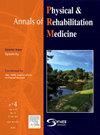Effects of exercise-based interventions on health-related quality of life in adults after cancer: A systematic review and meta-analysis
IF 4.6
3区 医学
Q1 REHABILITATION
Annals of Physical and Rehabilitation Medicine
Pub Date : 2025-04-18
DOI:10.1016/j.rehab.2025.101954
引用次数: 0
Abstract
Background
Due to the lack of available knowledge in the current literature, this systematic review and meta-analysis was aimed to assess the effectiveness of exercise-based lifestyle interventions, including healthy diet and/or psychological well-being on mental, physical and global health-related quality of life (HRQoL) in adults after cancer treatment.
Methods
MEDLINE (via PubMed) and Web of Science databases were searched for randomised controlled trials (RCTs) published until August 2024 evaluating exercise-based lifestyle interventions, including healthy diet and/or psychological well-being, which assessed mental, physical and global HRQoL.
Results
Of 6193 screened studies, 32 RCTs met the criteria. The total sample comprised 5528 participants (3003 intervention and 2525 control). There was a small effect size in a pooled analysis that found exercise-based lifestyle interventions improve mental HRQoL (d 0.11, 95 % CI 0.05 to 0.18). These effects were greater in those studies that combined exercise with psychological well-being (d = 0.19, P = 0.004), and with moderate-to-high intensity aerobic exercise (moderate intensity; d = 0.11, P = 0.02, high intensity; d = 0.16, P = 0.02, aerobic exercise; d = 0.16, P = 0.26).
Conclusions
Exercise-based lifestyle interventions do not enhance physical nor global HRQoL, yet those combined with psychological well-being seem to improve mental HRQoL in individuals after cancer treatment.
PROSPERO registration number
CRD42022369169.
基于运动的干预对成人癌症后健康相关生活质量的影响:系统回顾和荟萃分析
背景:由于现有文献缺乏相关知识,本系统综述和荟萃分析旨在评估以运动为基础的生活方式干预的有效性,包括健康饮食和/或心理健康对癌症治疗后成人心理、身体和整体健康相关生活质量(HRQoL)的影响。方法检索medline(通过PubMed)和Web of Science数据库,检索截至2024年8月发表的随机对照试验(rct),评估基于运动的生活方式干预,包括健康饮食和/或心理健康,评估心理、身体和整体HRQoL。结果在6193项筛选研究中,32项rct符合标准。样本总数为5528人(干预组3003人,对照组2525人)。在一项汇总分析中发现,以运动为基础的生活方式干预可以改善心理HRQoL (d = 0.11, 95% CI = 0.05 ~ 0.18)。在那些将运动与心理健康结合起来的研究中(d = 0.19, P = 0.004),以及中至高强度有氧运动(中等强度;d = 0.11, P = 0.02,高强度;d = 0.16, P = 0.02,有氧运动;d = 0.16, P = 0.26)。结论以运动为基础的生活方式干预并不能提高癌症治疗后个体的生理和整体HRQoL,而与心理健康相结合的生活方式干预似乎可以提高个体的心理HRQoL。普洛斯彼罗注册号crd42022369169。
本文章由计算机程序翻译,如有差异,请以英文原文为准。
求助全文
约1分钟内获得全文
求助全文
来源期刊

Annals of Physical and Rehabilitation Medicine
Medicine-Rehabilitation
CiteScore
7.80
自引率
4.30%
发文量
136
审稿时长
34 days
期刊介绍:
Annals of Physical and Rehabilitation Medicine covers all areas of Rehabilitation and Physical Medicine; such as: methods of evaluation of motor, sensory, cognitive and visceral impairments; acute and chronic musculoskeletal disorders and pain; disabilities in adult and children ; processes of rehabilitation in orthopaedic, rhumatological, neurological, cardiovascular, pulmonary and urological diseases.
 求助内容:
求助内容: 应助结果提醒方式:
应助结果提醒方式:


